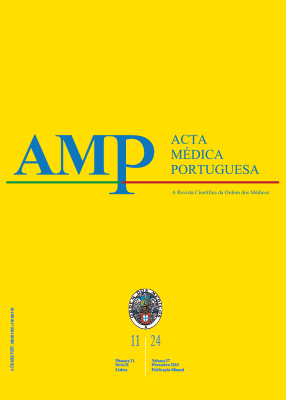Assessment of the Effect of Implementing an Obesity Center of Integrated Responsibility on Hospital Performance in Portugal
DOI:
https://doi.org/10.20344/amp.22103Keywords:
Clinical Governance, Health Management, Health Services Accessibility, Hospital Departments/organization and administration, Obesity, Outcome Assessment, Health CareAbstract
The continuous increase in the prevalence of obesity has generated growing concern, having become an important challenge at a global level in economic and public health terms. In Portugal, the treatment of obesity presents significant problems in access to health services. In this context, there is a need to implement new management models that offer more effective responses. Centers of integrated responsibility, already implemented in this area, are a cutting-edge approach, and it is important to evaluate their performance and identify recommendations for improving the model. The main objective of this study is to assess the impact of implementing an obesity center of integrated responsibility on hospital performance. This study was conducted using a comprehensive multiple-case study approach, which was predominantly descriptive but also included explanatory elements. The methodological approach is a well-balanced mix of quantitative and qualitative analyses. The study evaluates various hospital performance indicators, encompassing the dimensions of access, production, efficiency, quality, and economic-financial, both before and after the implementation of the new model. The overall results indicate that the implementation of an obesity center of integrated responsibility led to improvements in hospital performance, particularly in the dimensions of access, production, and efficiency. While these findings are promising, the study also identifies areas for potential improvement in the model, such as organizational, functional, and legal aspects, including the method of granting incentives and the funding process. In the analyzed cases, this new organizational model proved to be a solution for improving hospital performance, particularly around obesity. These units can play a fundamental strategic role in the National Health System, contributing to access to specialized treatments, retention of professionals and financial sustainability.
Downloads
References
Mohajan D, Mohajan HK. Obesity and Its Related Diseases: A New Escalating Alarming in Global Health. J Innovat Med Res. 2023;2:12-23. DOI: https://doi.org/10.56397/JIMR/2023.03.04
Chooi YC, Ding C, Magkos F. The epidemiology of obesity. Metabolism. 2019;92:6-10. DOI: https://doi.org/10.1016/j.metabol.2018.09.005
Organisation for Economic Cooperation and Development /European Union: Overweight and obesity among adults. In Health at a Glance: Europe 2022: State of Health in the EU Cycle. Paris: OECD Health Publishing; 2022. [consultado 2023 maio 18]. Disponível em: https://www.oecd-ilibrary.org/socialissues-migration-health/health-at-a-glance-europe-2022_26e2160a-en.
World Obesity Federation. World Obesity Atlas 2023. London: WOF; 2023. [consultado 2023 maio 30]. Disponível em: https://www.who.int/europe/publications/i/item/WHO-EURO-2021-2574-42330-58595.
Oliveira A, Araújo J, Severo M, Correia D, Ramos E, Torres D, et al. Prevalence of general and abdominal obesity in Portugal: comprehensive results from the National Food, nutrition and physical activity survey 2015-2016. BMC Public Health. 2018;18:614. DOI: https://doi.org/10.1186/s12889-018-5480-z
Marques A, Peralta M, Naia A, Loureiro N, de Matos MG. Prevalence of adult overweight and obesity in 20 European countries, 2014. Eur J Public Health. 2018;28:295-300. DOI: https://doi.org/10.1093/eurpub/ckx143
Páscoa R, Teixeira A, Henriques TS, Monteiro H, Monteiro R, Martins C. Characterization of an obese population: a retrospective longitudinal study from real-world data in northern Portugal. BMC Prim Care. 2023;24:99. DOI: https://doi.org/10.1186/s12875-023-02023-7
Borisenko O, Adam D, Funch-Jensen P, Ahmed AR, Zhang R, Colpan Z, et al. Bariatric surgery can lead to net cost savings to health care systems: results from a comprehensive European decision analytic model. Obes Surg. 2015;25:1559-68. DOI: https://doi.org/10.1007/s11695-014-1567-5
Bernardino M. Gestão em Saúde: organização interna dos serviços. Coimbra: Almedina; 2017.
Portugal. Portaria N.º 330/2017. Diário da República, I série, n.º 210 (31/10/2017). p.5848-52.
Yin RK. Case study research and applications: design and methods. 6ª ed. Los Angeles: SAGE; 2018.
Brito MJ, Rezende DA, Ávila GS, Lima Cardoso CM. O estudo de caso como método de investigação na pesquisa qualitativa em Enfermagem. In Atas do 8º Congresso Ibero-Americano em Investigação Qualitativa. Aveiro: Ludomedia; 2019. p.444-53.
Bardin L. Análise de Conteúdo. São Paulo: Edições 70; 2016.
Portugal. Portaria N.º 82/2014. Diário da República. I série, n.º 71 (10/04/2014). p.2364-6.
Entidade Reguladora da Saúde. Cuidados de saúde prestados no SNS na área da obesidade. Porto: Entidade Reguladora da Saúde; 2019. [consultado 2023 maio 05]. Disponível em: https://www.ers.pt/uploads/writer_file/document/2448/ERS_-_Cuidados_obesidade_SNS.pdf.
Porter M. Competitive advantage: creating and sustaining superior performance. New York: Free Press; 1985.
Downloads
Published
How to Cite
Issue
Section
License
Copyright (c) 2024 Acta Médica Portuguesa

This work is licensed under a Creative Commons Attribution-NonCommercial 4.0 International License.
All the articles published in the AMP are open access and comply with the requirements of funding agencies or academic institutions. The AMP is governed by the terms of the Creative Commons ‘Attribution – Non-Commercial Use - (CC-BY-NC)’ license, regarding the use by third parties.
It is the author’s responsibility to obtain approval for the reproduction of figures, tables, etc. from other publications.
Upon acceptance of an article for publication, the authors will be asked to complete the ICMJE “Copyright Liability and Copyright Sharing Statement “(http://www.actamedicaportuguesa.com/info/AMP-NormasPublicacao.pdf) and the “Declaration of Potential Conflicts of Interest” (http:// www.icmje.org/conflicts-of-interest). An e-mail will be sent to the corresponding author to acknowledge receipt of the manuscript.
After publication, the authors are authorised to make their articles available in repositories of their institutions of origin, as long as they always mention where they were published and according to the Creative Commons license.









